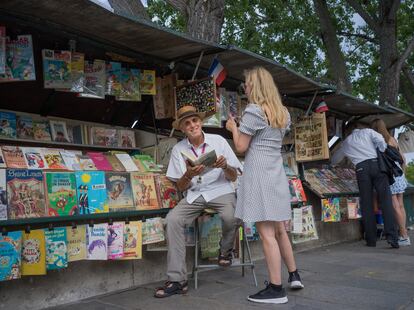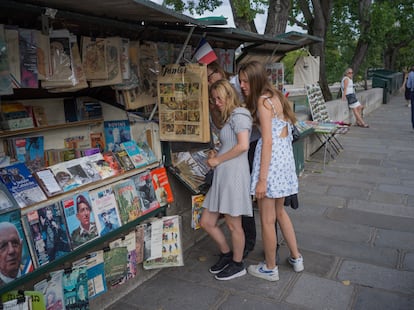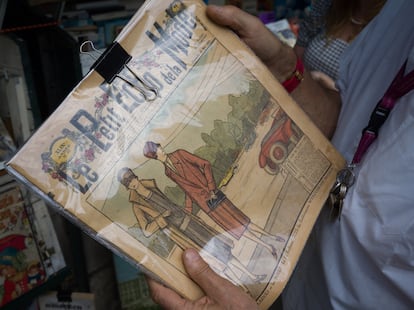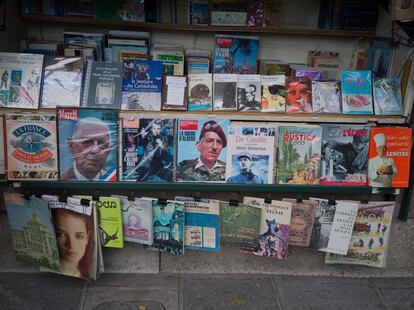The riverbank booksellers of Paris refuse to move for the 2024 Summer Olympics
French police say that temporarily relocating them is necessary to maintain security during the opening ceremony

Jean-Pierre Mathias spends just over half an hour every morning getting his bookstand near Notre Dame Cathedral ready. He carefully unlocks the four weathered green boxes. “They’re almost 100 years old,” he says indignantly. “If they take them apart, I won’t be able to put them back together again.” He and other “bouquinistes” (riverbank booksellers) are resisting a police proposal to dismantle the bookstands for the 2024 Summer Olympics in Paris, which they say is necessary to maintain security during the opening ceremony.
The opening ceremony will take place along a six-kilometer stretch of the Seine River between the Austerlitz and Jena bridges, just behind the Eiffel Tower. Booksellers have been a familiar sight along this part of the Seine for over 450 years. From their simple kiosks, they offer a captivating collection of rare and second-hand books, out-of-print editions, forgotten novels, and fine engravings and prints. These hidden treasures await the discovery of booklovers who meander through the streets, perusing the wares carefully stored in each box that sit on the stone walls of the riverbank.

There are approximately 1,000 bookstands in all, owned by 240 individual bouquinistes. Police say 570 need to be dismantled and relocated for the opening ceremony. The announcement has sparked worries among the booksellers, who are concerned about the potential damage and short time frame for the move. Although the boxes are not fixed to the wall but stand on stilts, moving them can be difficult due to their weight. Some can weigh up to 500 pounds (250 kilos), says Jérôme Callais, president of the street booksellers’ association. “Our position is very clear — don’t touch them,” he said, adding that his father built the boxes he uses. There is also concern about the potential loss of business during the important summer season, while many booksellers are still recovering from the impacts of the Yellow Vest protests in 2018 and the pandemic.

“I am willing to close down, but for how long?” asked Nathalie, who prefers not to give her last name. “Everyone talks about the charm of Paris. That’s fine, but for me, it represents my livelihood.” She has a little bit of everything in her bookstand — detective novels, cookbooks, vinyl records and old newspapers and documents. “Nostalgia sells well on the riverbanks,” she said, watching a young man rummage through books by Boris Vian, Simone de Beauvoir and Franz Kafka.
The Paris City Council, headed by Mayor Anne Hidalgo, promises that the bookstands will be reinstalled as quickly as possible after the ceremony. It also proposes to renovate and temporarily move the bookstands to a nearby area. But not many are convinced. “We are bouquinistes and that means being next to the Seine — it’s a historic tradition,” said Mathias, who has been selling books there for 40 years.
The tradition dates back to the 16th century, when wandering merchants peddled books and pamphlets near the city’s bridges. Slowly but surely, the profession underwent regulation until it finally obtained its own official status in 1800 under Napoleon Bonaparte. Today, it remains deeply ingrained in the collective imagination of the city. “It’s like dismantling the Eiffel Tower,” said Alain Papillaud, a 74-year-old retired bookseller.

Situated in front of the Académie Française (the principal French council for matters pertaining to the French language), Papillaud’s bookstand brims with an assortment of captivating children’s books. Remarkably, he boasts of having nearly 1,000 books for sale, attracting not only curious tourists but also avid collectors in pursuit of unique editions. Wanting to do something about the impasse, he sent an online appeal to Brigitte Macron, the wife of President Emmanuel Macron.
“The boxes are a part of us”
The bouquinistes, while exempt from rent and certain taxes, are still bound by a set of regulations. One such rule mandates that they open at least four days a week. Additionally, there are strict guidelines regarding the dimensions of the cherished boxes they use. They cannot exceed two meters (6′5″) in length, and the cover (when open) must not extend higher than 2.10 meters (6′9″) from the ground. The rules are meant to ensure that they do not obstruct the renowned Parisian views, even though they themselves are an integral part of the city’s fabric.

“The boxes are a part of us, of our identity,” said Mathias, who was a philosophy teacher before coming to Paris. “Mine are extraordinary,” he said, pointing out fine details like the hooks that hang from the top. Every one is a little different — new and old, with and without awnings, light green and dark green. It’s part of the charm, they say.
Mathias’s bookstand has a feature that sets it apart: a bench conveniently positioned right in front. This seemingly small detail is very important to him, because this is where he engages in conversations with customers and friends who drop by to visit. Mathias wants to do more than just sell books — he wants to foster connections and forge relationships.
“We’re living in a world where images and videos have become the primary mode of communication,” he muses. “We’d have way fewer problems if people had more face-to-face interaction.” As to prove his point, Mathias starts explaining to a passerby why the bouquinistes of Paris don’t want to move.
Sign up for our weekly newsletter to get more English-language news coverage from EL PAÍS USA Edition
Tu suscripción se está usando en otro dispositivo
¿Quieres añadir otro usuario a tu suscripción?
Si continúas leyendo en este dispositivo, no se podrá leer en el otro.
FlechaTu suscripción se está usando en otro dispositivo y solo puedes acceder a EL PAÍS desde un dispositivo a la vez.
Si quieres compartir tu cuenta, cambia tu suscripción a la modalidad Premium, así podrás añadir otro usuario. Cada uno accederá con su propia cuenta de email, lo que os permitirá personalizar vuestra experiencia en EL PAÍS.
¿Tienes una suscripción de empresa? Accede aquí para contratar más cuentas.
En el caso de no saber quién está usando tu cuenta, te recomendamos cambiar tu contraseña aquí.
Si decides continuar compartiendo tu cuenta, este mensaje se mostrará en tu dispositivo y en el de la otra persona que está usando tu cuenta de forma indefinida, afectando a tu experiencia de lectura. Puedes consultar aquí los términos y condiciones de la suscripción digital.









































